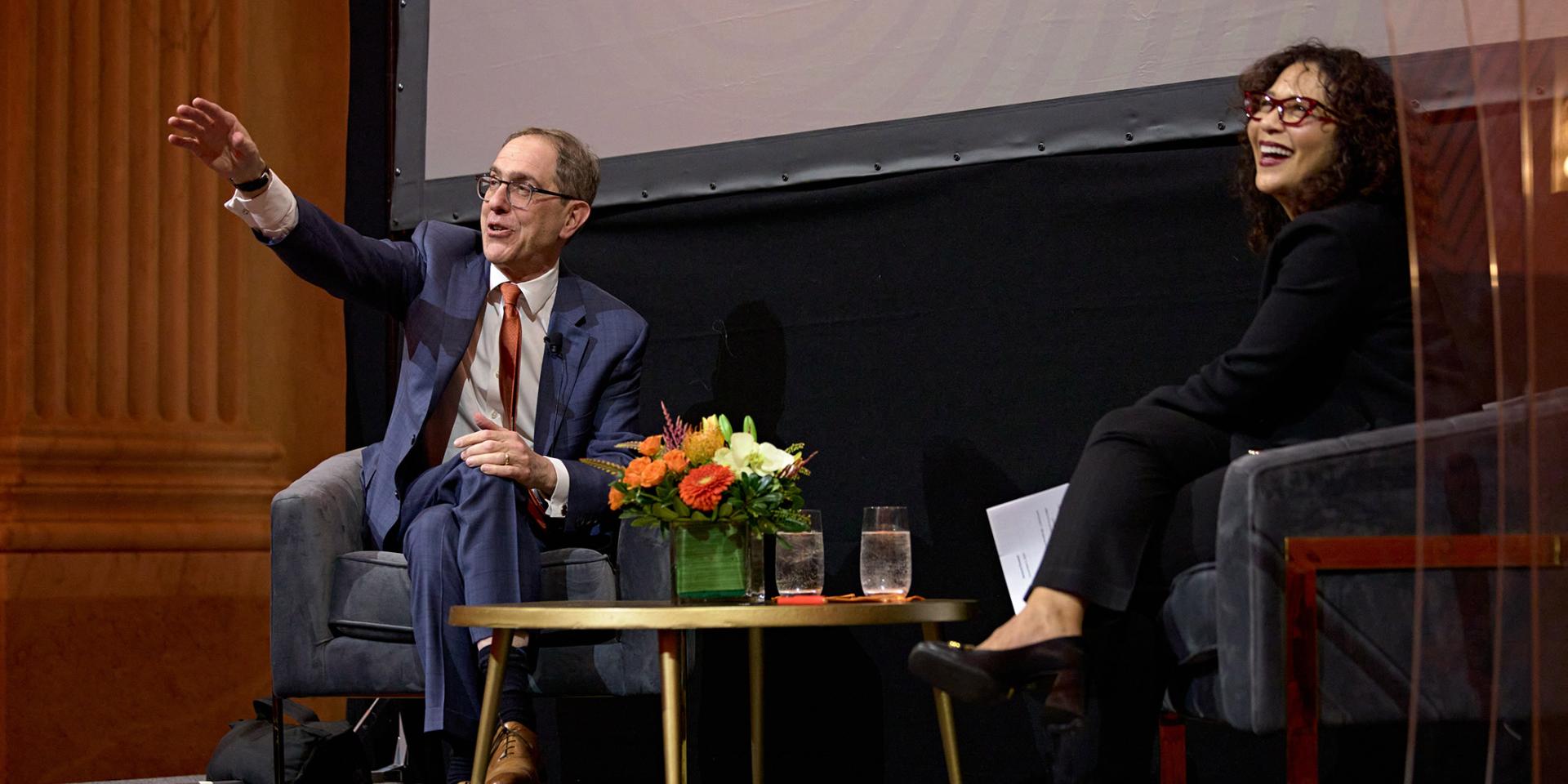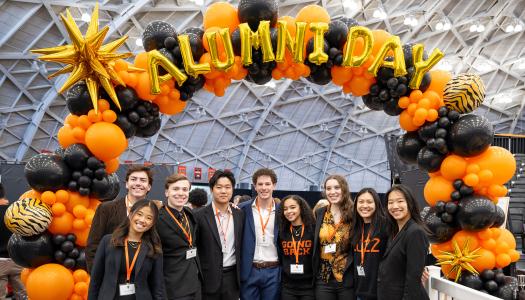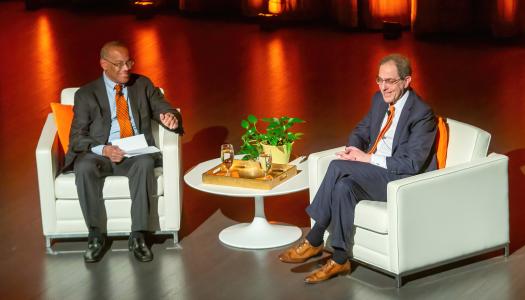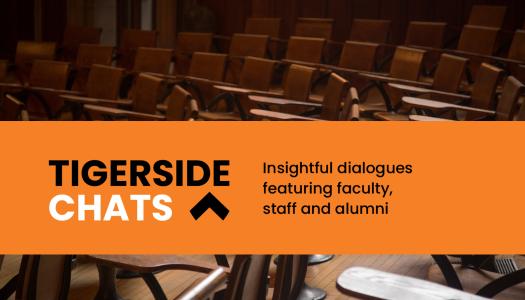Photo by Steve Freeman
President Christopher L. Eisgruber ’83 appeared at the Franklin Institute in Philadelphia on Dec. 5 for a special event with alumni and friends, marking the beginning of the final year of the Venture Forward campaign.
About 250 alumni attended, accompanied in the institute’s orange-lit rotunda by its 20-foot marble statue of Founding Father Benjamin Franklin. “I have to say it is very intimidating in a way to answer these questions with one of the greatest American intellectuals of all time, literally on a pedestal, looking down on us,” Eisgruber joked at one point.
Alumni Council President Monica Moore Thompson ’89 began the evening by welcoming alumni and introducing a new Venture Forward video. “The Venture Forward campaign highlights alumni engagement as one of its strategic pillars, shining a bright light on the many ways that alumni come together as unique individuals to learn, to volunteer and to reunite like at this evening’s event,” Thompson said. “Princeton made an audacious bet on who we are and what we could become and accomplish.”
On stage, Eisgruber was joined by Lisa Washington ’89, senior vice president and chief legal officer at WSFS Bank. She began their conversation by welcoming him to Philadelphia and asking him to select the University achievements he’s most proud of since becoming president of Princeton in 2013.
Eisgruber pointed to the expansion of the undergraduate student body and the increase in socioeconomic diversity. “I knew [when I was provost] and I know now that we turn down thousands and thousands of students every year who would be spectacular Princetonians if we could admit them,” Eisgruber said. “So I felt like two things that I absolutely had to do was expand the undergraduate student body and increase the socioeconomic diversity of the University.
“We have done those two things. We have beautiful new residential colleges; we have added 500 students to the undergraduate student body. Those 500 students are people who will go on to become spectacular Princeton alumni who are contributors to the community.”
Eisgruber noted that the number of Princeton students from the Class of 2028 who qualify for need-based federal Pell grants is 22%, tripling the 7% from 20 years ago. “We went from being among the laggards in our sector to the leader in our sector,” he said to audience applause.
Socioeconomic diversity was also enhanced by the reinstatement of the transfer program in 2018, he said. “We brought it back in a different way: All of our transfers are either community-college transfers or military veterans,” he said. “These are students of a different kind than we had on the Princeton campus before, and they add a special element to our student body.”
When Washington asked if there was a Princetonian “who is no longer with us who you would have liked to have a conversation with,” Eisgruber’s response reflected both his academic interests and the event’s historical setting. “As a constitutional lawyer, I have to say James Madison because it continues to astonish me what kind of vision and foresight Madison had as somebody who brought the benefits of a liberal arts education at Princeton to thinking about the design of the United States Constitution.”
The mention of Madison’s liberal arts education in the 18th century segued into its importance in the future, as Washington asked, “Do undergraduate degrees and disciplines like comp lit, classics or philosophy have a place in our increasingly technologically focused society?”
“I think they have growing importance in our increasingly technological society because they are important to enabling us to understand, as technology challenges us, to think about what it means to be human and how we interact with one another,” Eisgruber said. He pointed to a recent campus event with Eric Schmidt ’76, whose new book, “Genesis: Artificial Intelligence, Hope, and the Human Spirit,” discusses the opportunities and challenges of artificial intelligence (AI). “It’s debatable exactly what things AI can and cannot do. But guess what — it’s really good at coding,” Eisgruber said. “So [coding] ends up not being the kind of skill that can’t be replaced by computers. And as I talk to people, including folks like Eric Schmidt, the former CEO at Google, the ability to think in these creative and imaginative ways about humanity and about other problems that you learn from studying disciplines like philosophy and computer science continues to be very important.”
When asked by Washington how alumni can best support the University, Eisgruber emphasized the importance of Annual Giving and encouraged all alumni to use their voices to promote the value of higher education. “When you see these videos about audacious bets that we’re able to make, and when I talk about the financial aid that we are able to provide, and we’re able to push the envelope on just about everything we do, it is because our extraordinary alumni body contributes to the University in a way that is unsurpassed in the world,” he said. “As somebody who is trying to lead the University forward and was previously the chief budget officer, knowing that Princetonians care and care enough to send that check is extraordinary.”
Eisgruber urged alumni to spread the word about the importance of higher education by sharing their own personal Princeton stories. “Tell the story of how education mattered in your life, and how education and research matter to the world,” he said. “If you’re in this room tonight, you know the difference that a research university like Princeton University can make. … We have got to be telling the story of how it is colleges and universities change the world for the better right now, because people are hearing other kinds of stories about these institutions, and they matter so much to the country. This is where I feel how appropriate it is to see Ben Franklin sitting there as the founder of the University of Pennsylvania, somebody who understood the value of education to a fledgling America that eventually enabled us to build into what we are now. We have got to tell that story.”
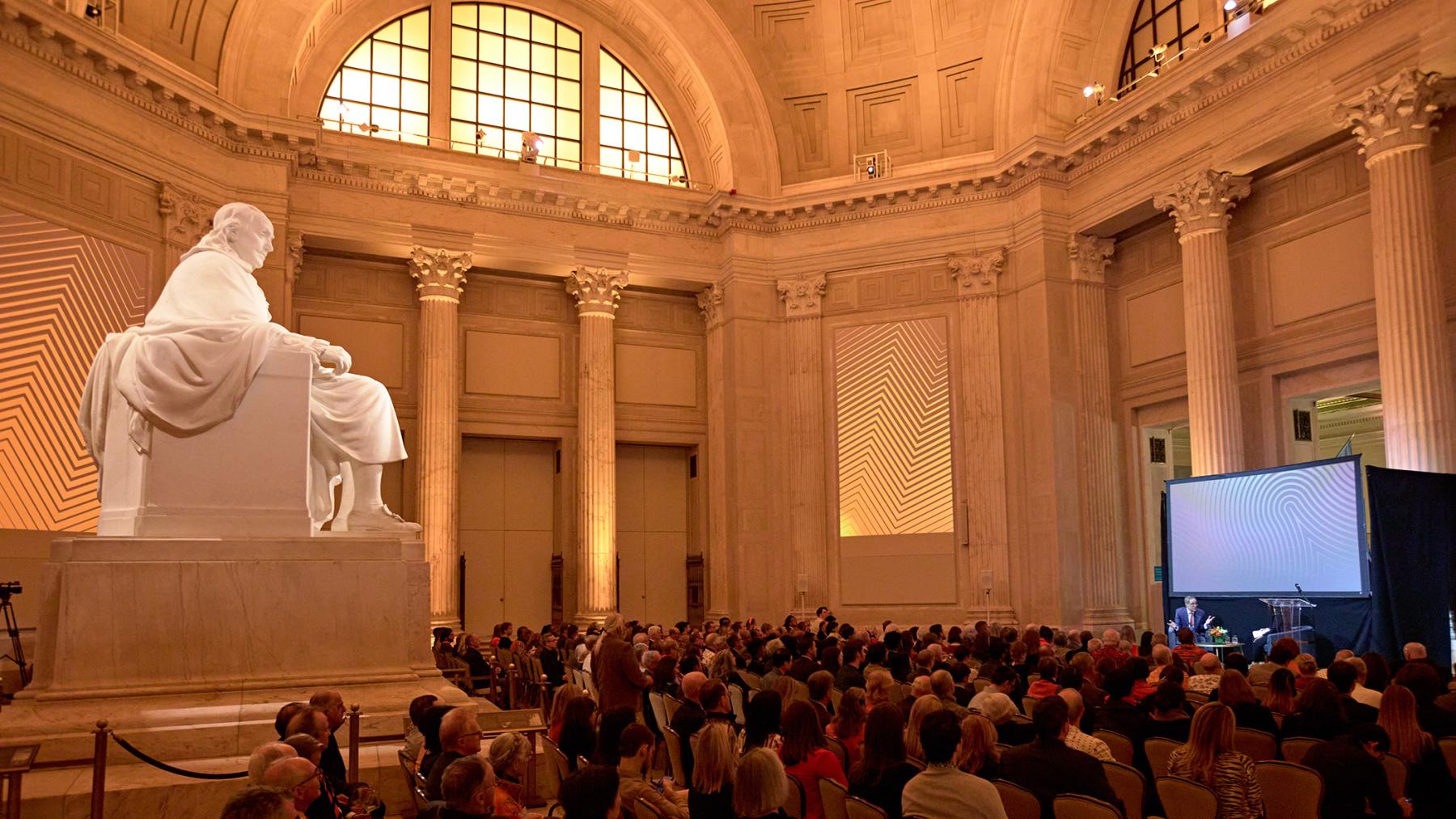
During the audience Q&A, Eisgruber welcomed the opportunity to discuss how the University endowment works when an alumnus asked how it functions and impacts student experiences.
“People sometimes look at the endowment and say, ‘That’s a big savings account sitting off to the side of the University budget.’ The endowment isn’t a savings account — it’s more like an annuity,” said Eisgruber, who explained that the current University spend-rate is more than 5% — or about $1.5 billion — per year, and that it needs to last in perpetuity, so giving each year by alumni is important to maintaining the University’s excellence.
“[The endowment] is the reason that our students are able to graduate without debt,” he said. “It’s the reason that we offer the best financial aid. It’s the reason that we were able to take up our graduate stipends to be the best in the country. It’s the reason we’re able to improve the housing that we offer to graduate students — and to do all that at the same time we’re pushing the boundaries of knowledge with first rate research programs. We’re doing that because it’s driven by the combination of what the endowment allows us to do with what our alumni allow us to do.”
Another alumnus asked Eisgruber how Princeton can apply its research and excellence to support communities that might benefit most from it, such as Philadelphia. “Princeton’s mission requires that it go beyond its borders in a lot of different ways,” said Eisgruber. “The work that Matt Desmond does, for example, on questions about eviction, apply very directly to the challenges that our major cities in the United States are facing right now.”
Eisgruber also cited the Nobel-winning research of physicist John Hopfield, who published a “purely speculative” paper about neural networks 40 years ago, as an example of the types of innovative research that have since become foundational.
Lastly, Eisgruber detailed how Princeton was investing heavily in the region, from its partnerships with local community colleges through the Teaching Transfer Initiative to the New Jersey AI Hub: “The hub is designed to bring in as partners — the government, many institutions throughout the state of New Jersey and corporate entities — to create jobs and to create possibilities to improve and strengthen the region as a whole.”
The last question from the audience addressed the LENS initiative, a relatively new program that provides paid summer service internships for all undergraduates. “We decided that as part of the Venture Forward campaign, one thing that we wanted to do was to make it possible for every Princeton student to have a service experience,” Eisgruber said. “We were able to do that by bringing together a number of gifts that had been given to the University — some by classes, some by individuals — and supplementing it with Annual Giving. What we have now is a set of opportunities for students to volunteer and serve during their time at Princeton.”
At the close of the program, Debby Park ’22, Katie Knorr ’13 and Anthony Roth Costanzo ’04 stepped forward to lead the audience in the singing of “Old Nassau.”
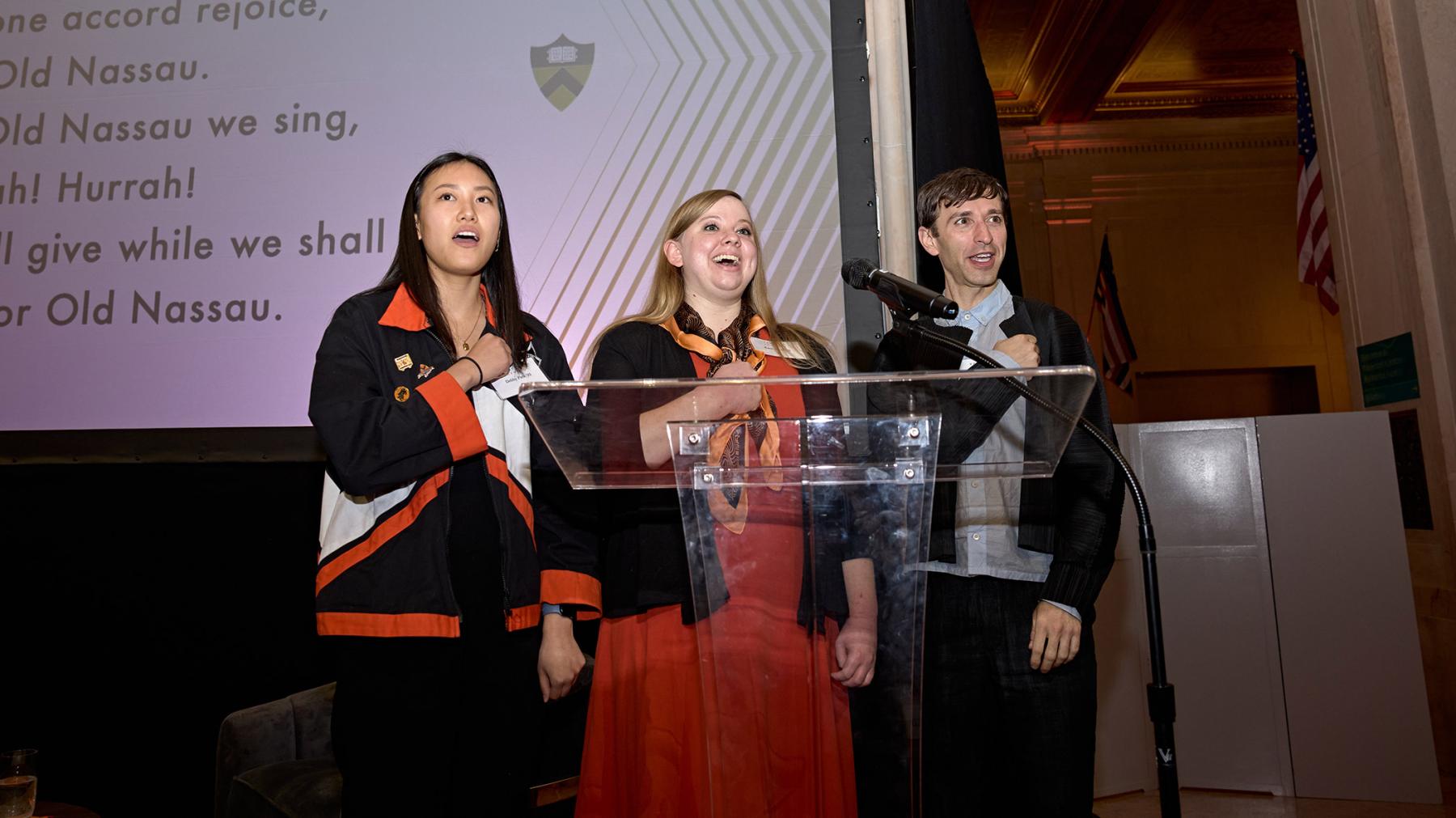
The next Venture Forward gathering with President Eisgruber will be in Austin, Texas on Jan. 7. Eisgruber will be joined in conversation by Gabe Debenedetti ’12, national correspondent for New York Magazine. Subsequent gatherings will be held in Houston (Jan. 8) with Christopher Sarofim ’86, chairman of Fayez Sarofim & Co., and Seattle (April 2) with John Mack ’00, Princeton’s Ford Family Director of Athletics.
